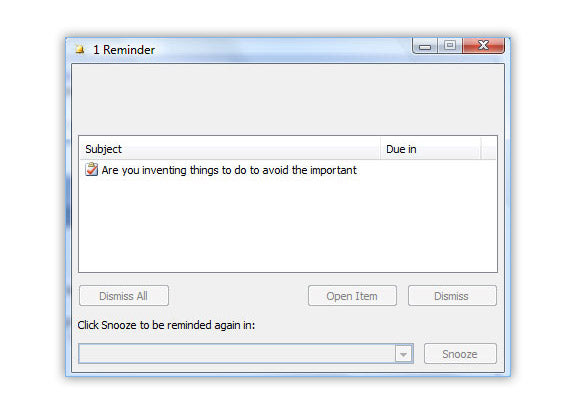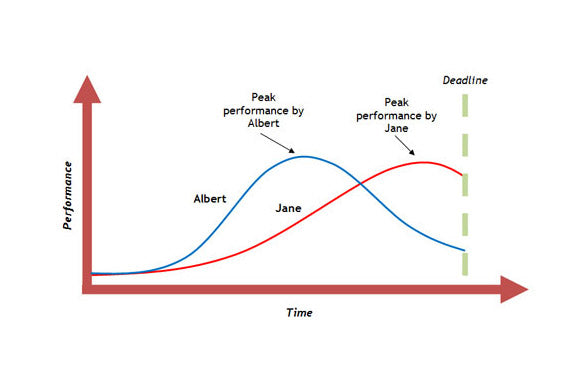Procrastination is what we do when avoiding doing important things. We defer our decision or action to a different time. Procrastination is a mechanism for coping with anxiety associated with starting or completing an action. Procrastination also means that we overestimate difficulties associated with doing something or making a decision. As a result, we postpone our tasks hoping that at some point in the future we will find a better environment to deal with those difficulties. This error of judgement often proves costly as procrastination becomes a habit and this causes regret for the decision maker. Fear of failure, perfectionism, weak prioritisation, inability to make important decisions or emotional mood swings are other factors preventing individuals from doing what they should be doing at a suitable time.
Procrastination has internal and external consequences. Internal problems caused by procrastination include anxiety, guilt and stress while external issues are lack of productivity, reduced success rate and failing responsibilities. There have been numerous researches studying psychological roots of procrastination and how it can be controlled. Dan Ariely and Klaus Wertenbroch from Massachusetts Institute of Technology carried out research on the effect of deadlines in controlling procrastination. They found that individuals are happy to self-impose deadlines to overcome procrastination and more importantly these deadlines often worked. This article focuses on some practical solutions which can be used to defeat procrastination:
Identify When You Are Procrastinating
Everyone procrastinates. Examples are reading blogs when you have to write an article, sending a non-urgent email instead of paying bills and even washing the car rather than doing tax return. We do these things because the difficulty associated with the first set of tasks are much less than those associated with those important stuff. By realising that you are procrastinating you can take a minute to evaluate the importance and urgency of each task and contemplate the future cost of postponing those important ones. Being aware of procrastination enables you to find a way of avoiding it and to choose how to overcome this distractive habit.
Prioritize
Make sure you capture all the important stuff you need to do on each day in your To-Do list with the most important tasks at the top. Don’t overload your To-Do list with unimportant and non-urgent tasks. Set only two or three essential things that need to be done for each day. These are actions or decisions which affect your personal or professional life enormously. These important tasks are high priority and you need to allocate time and space for them in your daily schedule.
Make Your Environment Productive
Depending on what type of environment you work in, you can reduce the level of external distraction which will prevent you from attending those high priority tasks or lead you to procrastinate. For example if you find phone calls distracting or if you spend a long time chatting on the phone procrastinating, change your environment to work without phones, switch your mobile off and activate the voice mail. You can check these messages in your breaks. If you are addicted to browsing, reading blogs or just stumbling on the net, try working without an internet connection. Use a tidy desk that does not distract you and use a separate room from your colleagues if possible, especially when you need to get important tasks done. If you have open plan offices, a common tactic is to escape to a meeting room and focus on your important tasks away from your desk. It is much more likely for people not to interrupt you if you are not at your desk.
Treat Yourself
What is it you do when procrastinating? Is it checking emails every half an hour, reading news, making tea or rearranging your desk? Allocate some time during the day to get to do all the things you enjoy. For example you are allowed to read one article on whatever subject you like every two hours providing that you get something of high priority done first.
Evaluate Your Actions
Is what you are doing moving you closer to your ultimate goals or are you just inventing things to avoid more important tasks? Evaluate and examine your actions and their consequences on a regular basis. Decide what is working for you and what is a waste of time. Do you need to change the way you do things in order to avoid procrastination and become more successful? You can write down your thoughts, ideas and solutions and rearrange your plans to become more productive and use your time more effectively.
Set Automatic Reminders
Thanks to the wonders of technology, now we can use the machines to check on us and make sure we do what we promised. Use the computers as your guides. Give them clear instructions to make sure you do not fall off the planned route. For example, if you use Outlook for your calendar, set periodic daily reminders with the following action: “Are you inventing things to do to avoid the important”. Set the timing to be when you are most likely to procrastinate. You will be amazed how this simple reminder makes you guilty of procrastination and gets you back to work as if a pushy boss is standing on your shoulder telling you off if you are not working. Sometimes we need a digital boss to get things done.
Comments
By Chris @ Monday, December 14, 2009 6:59 PM
Absolutely love the tip on Outlook reminder. Fantastic!!!
Soft Skills Training Materials
Get downloadable training materials
Online Train the Trainer Course:
Core Skills
Learn How to Become the Best Trainer in Your Field
All Tags
Training Resources for You

Course Design Strategy
Available as paperback and ebook

Free Training Resources
Download a free comprehensive training package including training guidelines, soft skills training activities, assessment forms and useful training resources that you can use to enhance your courses.

Our Comprehensive Guide to Body Language

Train the Trainer Resources
Get Insights - Read Guides and Books - Attend Courses
Training Materials
Get downloadable training materials on: Management Training, Personal Development, Interpersonal Development, Human Resources, and Sales & Marketing














Leave a comment
All comments are moderated before being published.
This site is protected by hCaptcha and the hCaptcha Privacy Policy and Terms of Service apply.